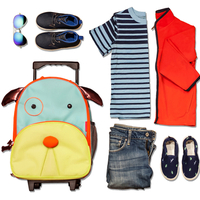
With thousands of families expected to travel abroad in the coming weeks, experts are urging parents to pack children’s medicines in their cabin bags.
Research conducted in America suggests that most in-flight incidents could be dealt with swiftly, but that most airlines don’t carry sufficient stores of children’s medication. Researchers at Duke University analysed data looking at 11,000 medical incidents involving children across 77 different airlines between January 2015 and October 2016. The most common conditions were sickness, fever and allergic reactions.
Having looked at the data, the team deduced that most airlines don’t carry children’s medicines in their medical kits. Although many do provide access to antihistamines and painkillers, most are in tablet form, and are therefore unsuitable for young children.
Dr Alexandre Rotta, lead author, encouraged parents to take precautions when travelling with children, especially those with underlying conditions, for example, asthma, and those with allergies. Medical kits are not usually tailored to children, and it’s much safer to travel with medication in your hand luggage.
Dr Donald Macgregor, from the Royal College of Paediatrics and Child Health, stated that “children are not mini adults,” and therefore parents should be armed with child-friendly medications. It’s a good idea to read up and find out about common illnesses and to ask a pharmacist for advice before travelling to ensure you do have access to the right treatments if your child does become unwell during the flight. Most treatments that are designed to tackle common minor ailments that are suitable for children are available over the counter.
It is worth noting that there are restrictions in place in terms of what you can take on a flight, but essential medicines that are over 100ml are allowed on board, provided that you have a copy of the prescription, or they are accompanied by a letter from a GP.